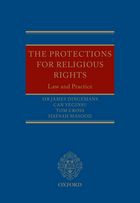The Protections for Religious Rights: Law and Practice

The Protections for Religious Rights: Law and Practice
Sir James Dingemans, Can Yeginsu, Tom Cross, and Hafsah Masood
Oxford University Press 2013
About the book
- The first book comprehensively to tackle the legal protections for religious rights.
- Addresses the key standards and provisions through coverage of a substantial body of domestic and international case law, providing an essential reference for practitioners, academics, and students alike.
- Provides guidance on practice and procedure as well as substantive law.
- Includes relevant sections of domestic statutes, constitutional provisions and international instruments, as well as other selected appendix materials.
The Protections for Religious Rights is the first practitioner work to offer a full and systematic treatment of the law as it pertains to religious rights in the UK and abroad. A practical working aid to a sensitive and important area of increasing litigation and public debate, this text examines the applicable legal instruments, considers the current state of the law, and reviews domestic, comparative, and international case law to provide a comprehensive reference resource that informs on all matters of significance in this area.
The protections for religious rights in the UK are rooted in international law and the English common law. Religious conflicts have arisen when communities have perceived that their religious rights have been targeted for suppression, or ignored. Despite international human rights instruments which are intended to protect such rights, many courts have adopted a narrow and restrictive approach towards these aspects.
With practical evaluations of the relevant international instruments which inform domestic law in the UK, the important substantive areas of employment, education, family, and goods and services, are addressed specifically in dedicated chapters. Comparative perspectives are also considered in an extensive chapter offering global treatment of legislation and authorities, drawing on expertise from the United States, Canada, South Africa, Australia, India, Ireland, New Zealand, and Turkey. Other areas where protections for religious rights are engaged are addressed in a final chapter – including coverage of places of worship, criminal law, planning, charitable status, prisons, immigration, and animal rights – making this text a complete resource for all concerned or interested in this area of law.
The text includes an appendix of selected materials for easy reference to relevant extracts from international treaties, constitutions and domestic statutes.
Readership: Practitioners, the judiciary, academics, and students who work in the areas of public law, human rights law, employment law, education law, public international law, and commercial law. Religious organisations and the public bodies that contract and deal with them.
Author Information
Sir James Dingemans, One of Her Majesty’s Judges of the Queen’s Bench Division, Can Yeginsu, Barrister, 4 New Square, Tom Cross, Barrister, 11KBW, and Hafsah Masood, Barrister, 3 Hare Court
Sir James Dingemans was appointed a Judge of the High Court, Queen’s Bench Division, in June 2013. Before that he was a Queen’s Counsel practising from 3 Hare Court, where he was also Head of Chambers. He had been a Recorder since 2003, and a Deputy High Court Judge since 2010. He is a Master of the Bench of the Inner Temple.
Can Yeginsu was called to the London Bar in 2007 (Inner Temple) and is a barrister practising from 4 New Square in the fields of Public Law, Human Rights, Employment and Commercial Dispute Resolution (including International Arbitration). Can has appeared in cases involving religious rights and continues to advise and publish in this area.
Tom Cross was called to the London Bar in 2007 and is a barrister practising from 11KBW, with practice specialisms in Public Law, Human Rights, Education, and Employment. His writing is published in a wide range of journals covering those and other fields. In 2008-2009 he taught the law on torts at City University, London, and in 2009-2010 he was a Judicial Assistant to the UK Supreme Court in its first year.
Hafsah Masood was called to the bar in 2006 and is a practising barrister from 3 Hare Court with experience in Public Law, Human Rights, Public International Law and Employment. Hafsah has worked at the Law Commission, as a member of the Public Law team, and in 2008-2009 she was Judicial Assistant in the Court of Appeal.